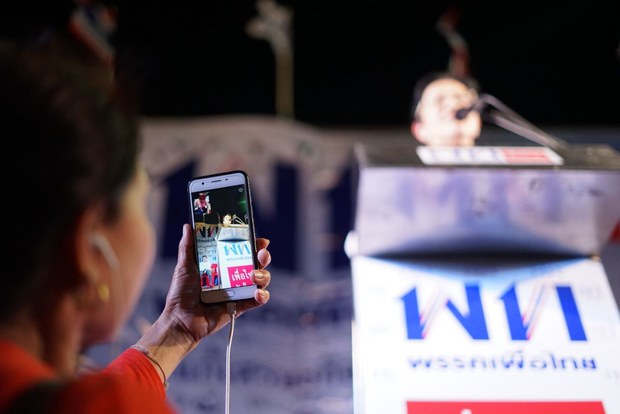Thailand Tightens Internet Controls, Approves Cyber Bill
2019.03.01
Bangkok
 A supporter of the Pheu Thai Party uses the internet and a mobile phone to transmit images during an electoral campaign in Nonthaburi province, on the outskirts of Bangkok, Feb. 26, 2019.
A supporter of the Pheu Thai Party uses the internet and a mobile phone to transmit images during an electoral campaign in Nonthaburi province, on the outskirts of Bangkok, Feb. 26, 2019.
A newly passed cybersecurity bill empowers state agencies to monitor internet traffic even without a warrant, rights advocates and a lobby group for high-tech companies said Friday, in the latest sign of a junta clampdown on online speech weeks before long-promised polls.
The Cybersecurity Act, which was unanimously approved on Thursday, would potentially compromise private and corporate data, according to the Singapore-based Asia Internet Coalition (AIC), whose members include Facebook, Google and several other major technology companies.
“The law’s ambiguously defined scope, vague language and lack of safeguards raises serious privacy concerns for both individuals and businesses,” said Jeff Paine, AIC’s managing director.
“This would give the regime sweeping powers to monitor online traffic in the name of an emergency or as a preventive measure, potentially compromising private and corporate data,” Paine said in a statement.
The National Legislative Assembly passed the cybersecurity bill more than two years after the military-appointed legislature adopted another law, the Computer Crimes Act (CCA), giving the military government broad powers to restrict free speech and enforce surveillance and censorship, according to the Human Rights Watch.
Only a handful of lawmakers opposed the measure, which will be submitted to the king for his signature before it takes effect with publication in the Royal Gazette.
Since Army Gen. Prayuth Chan-o-cha overthrew the elected government of Yingluck Shinawatra in 2014, his National Council for Peace and Order (NCPO) – the official name of the junta – has taken steps to curtail freedom, including banning the gathering of more than five people. It has also aggressively enforced an existing Lese-Majeste law, which makes it a crime to insult the king or the royal family.
“This cybersecurity law is a consequence of 2006 coup that security officials and rulers have been longing for to control cyberspace,” Sunai Phasuk, a Thai researcher for Human Rights Watch, told BenarNews, referring to the coup that deposed Yingluck’s older brother, Thaksin.
“They did not have such a tool in the past,” Sunai said. “To put it simply, until now the NCPO hasn’t abolished orders or announcements that deprive rights and freedom necessary to make elections free and fair.”
The junta also suspended opposition media, including Voice TV, a station owned by Thaksin’s son. This week, a court ruled that the nation’s broadcasting regulators had unlawfully suspended the station on Feb. 12, when they ordered the station to go dark for 15 days for allegedly airing program content that caused public confusion and divisiveness.
The station went off the air at midnight Feb. 13 but began broadcasting again on Feb. 15, after lodging a suit against the NBTC and obtaining a court injunction.
During “emergency cases,” the Cybersecurity Act 2019 empowers authorities to access online information, search computer data and networks, make copies of information and seize computers, without a court warrant. Real-time online traffic can be monitored and criminal penalties will be imposed to those who violate orders.
The law stipulates that the prime minister would lead the National Cybersecurity Commission, supervising an apparatus that would “prevent, cope with and lessen the severity of cyber threats.”
Saowanee Suwancheep, chief of the committee that drafted the cybersecurity bill, called a snap news conference to quell fears that the the legislation might leade to abuse of power.
“I’m clarifying here that there is no element in the law that empowers authorities to breach rights and freedom of citizens, she said. “Searches must be pre-approved by a court.”
“It is aimed at containing national threats and [the cybercrime law] has clear definition of what threats are,” she said.
Since it seized power five years ago, the junta has prosecuted about 100 people on charges of violating Lese-Majeste, under which offenders can be sentenced to as many as 15 years in prison, according to rights groups.
Earlier this year, police charged seven pro-democracy activists with sedition and defying a ban on public gatherings for leading a January demonstration that drew about 100 people in downtown Bangkok. The junta lifted that ban in December last year.
An academic expressed concerns that the cybersecurity law’s definition of “threats” was too broad.
“The problem lies in the interpretation of officials, what are deemed security issues. It may be used for political purposes,” Titipol Phakdeewanich, dean of the political science faculty at Ubon Ratchathani University, told BenarNews.
“It is fearsome when that authority is used under the junta or the NCPO, which enjoys draconian powers,” Titipol said. “The government might use it to attack its political opponents.”







